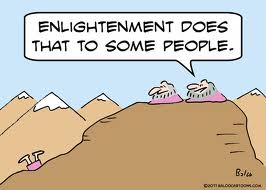 The endlessly fascinating thing about those who suppose to know Michael Jackson, who have written about him or even those who have spent time with him, is that they seem to have missed how deeply spiritual the man was. Or how far he had progressed along the path of enlightenment.
The endlessly fascinating thing about those who suppose to know Michael Jackson, who have written about him or even those who have spent time with him, is that they seem to have missed how deeply spiritual the man was. Or how far he had progressed along the path of enlightenment.
Some are going to scoff at that statement about enlightenment but a seeker knows another seeker by the language he or she uses in particular, and how they spend their time which is spending life. It’s kind of like having a secret handshake to identify a kindred spirit.
There are those who think they are qualified to evaluate the spirituality of Jackson, but are not so qualified as they think. I have said many times that we see the world not as it is, but as who we are being. From Don Quixote: “Sanity may be madness but the maddest of all is to see life as it is and not as it should be.”
It is the dreamers, the cultural creatives, the artists, artisans, the geniuses, the philosophers who dream of a better world and in so dreaming, inspire and aspire to make it better. If Martin Luther King had not dreamed of equality, we would not have come so far with civil rights. If Steve Jobs had not dreamed of a world connected, we would not have the social media and mileau we have now. We could name hundreds of those examples.
In my youth it was “flower power” and as misguided as it may have seemed to some, the youth movement of the sixties was a dream of “war no more” of people getting along as brothers in a brotherhood of man. The music of that time was more anthem than story: “He Ain’t Heavy; He’s my Brother.” The youth of that time knew that the ways of their parents, the old ways weren’t working. It was an attempt at departure from serving “the man” or “the establishment” seen as slavery to the military industrial complex and a pseudo civil and faux puritanical society. It was hypocrisy that fueled the movement.
The current “occupy” people are the next generation of dreamers, who envision a world where everyone has a voice and where humans are valued and not exploited by corporations that should be serving them and not the other way around. It imagines a sane government that values its constituency enough to install healthcare for all and social programs that address human problems. The movement is a dream yet to be realized. Time will tell if it has power as a grass roots movement or staying power. It is an evolving philosophy that is constructed in the spirit of “circle” instead of hierarchical structure and top-down management and government. Just born and standing on wobbly legs, what it doesn’t have in organization and force, it has in heart. It too, imagines a better world for its species.
The more cynical among the population see something else and even something more sinister. As with everything, its’ definition is in the eyes of the beholder. It’s all about intention and how one chooses (yes, it’s a choice) how to view the world. You are likely to find what you are looking for. What is your intention? That is where life will lead you. What lens are you looking through? The “color” of that lens is what selects what to bring into your consciousness. What you focus on all day long, is what you are creating in your life. The act of creation is what you place your attention on. How you look determines what you will see and how you will interpret what appears. Who you are looking as determines what your picture of the world is and from that you will extrapolate your philosophy. Do you view the world as a dangerous place? An endlessly fascinating magical world? Or do you see it as a messy hodge podge of humanity teeming with potential? However you see it, you are right. Correct. It’s ultimately an illusion, a kind of mirage but it is your mirage. And if a group of people collectively agree about that “reality” it actually becomes the prevaling reality. That is the vector factor.
If you make someone your enemy, they are. If you are paranoid and fearful becasue of past experience and trauma, then everyone becomes a potential enemy. The reason the world is so frightening then, is because you are not seeing the world as it is, but you have dragged your past into the present and it has “colored” the present as dangerous, and predicted the future to be the same way. Your world will become a nightmare and your life an excuse to find enemies everywhere you look.
If you have a cynical viewpoint of the world, then all human beings are potential predators. Humanity will look “bad” and if you add a rigid religious overlay of beliefs, humanity becomes “evil.” The mind of this kind of person scans the horizon and finds all kinds of evidence in the world to justify the belief that people are sinners and potentially capable of evil. The world gets divided then– into them (the evil ones) and us (the saintly crew destined for salvation.)
If you are a wannabe, then anybody who represents what you fancy yourself to be but don’t quite attain, will be resented. For example, if you are a wannabe superstar who craves attention, fame and fortune, and you don’t quite measure up or believe it is a pipe dream entirely unreachable, you will begin to resent the actual superstars. They will come to represent that which you can never be. In order to deal with the internal feelings of inferiority and hopelessness, you might adopt an unconscious (or sometimes conscious) mission to find fault with superstars. Its the logic of someone who thinks: ‘If I can’t have what I want, neither can anyone else.”
In particular a zealous and rigid religiosity combined with a cynical world view is the most dangerous mind set and attitude on the planet. It is the attitude that employs the slash-and-burn destruction philosophy to those who don’t belong to the elite few destined for salvation. It is the mind set that brought us Osama bin Laden and September 11, 2001 in New York city.
A watered down version of that rigid morality can be found in the tabloid reporter mentality. Those who are wannabe stars make it their business to find something sinister in those who do shine and bring them down. It’s the cynicism that says “nobody can be that generous, that loveable, that magnanimous– there must be something wrong with them.” And they set out to find that something to destroy the person with. These are people who feel absolutely justified in their envy and jealousy never realizing they are breaking the 10th commandment to not covet what is thy neighbor’s. They seem blissfully ignorant of their own transgressions and that they employ one of the sins considered among the seven deadliest– envy.
The amazing feat of human beings and the mind is that amongst the myriad of events, situations, people and positions in the world, one particular viewpoint is occupied and the individual then begins to extract from the world, all kinds of evidence to support the viewpoint they occupy. And of course, the more evidence that you are right, the more entrenched becomes the viewpoint because, after all, you are right. Right? A simple way to “get” this concept is to remember the game you played on road trips where you decided what to look for on or along the road and everyone in the car agreed to play with you. Or it’s similar to buying a little yellow Vokswagen and suddenly you see all kinds of them on the road. Because you are now conscious of them, everybody and his brother seems to own a little yellow Volkswagon.
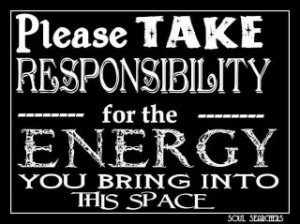 Life looks different to human beings because human beings are different. The life view, and extrapolated philosophy from here is unique. No matter where here is. It is informed by the world and informs the world in return as who you are being. Let’s play with that…
Life looks different to human beings because human beings are different. The life view, and extrapolated philosophy from here is unique. No matter where here is. It is informed by the world and informs the world in return as who you are being. Let’s play with that…
Imagine you are in law enforcement. A crime investigator, detective or vice officer. What will you be looking for? When on duty, what will you be observing? What will you focus on, spend your time on and channel your energy into? What will your predominent view of human beings be? Will everyone appear to you as a potential criminal? Before you speak to someone who looks suspicious, you will have judged that person as potentially “bad” and your evaluation will begin there because that is what you are trained to do. Will people be guilty first and then prove to be innocent? What will the majority of your time, and therefore your impression of humanity, be focused on? What about when you’re off duty? Will your predominent view color your experience then? Or will you turn it off when you get off work? Does thinking from a particular perspective become a habit? Why or why not? How does that impact life?
Now imagine that you are a talent scout for a major industry. Your job is to scout the field for local talent that stands out from the crowd– in whatever industry you represent. What will you focus on? What qualities will you be looking for? What will you find? How will you feel at the end of your workday?
Now imagine you are reporter with an assignment to collect stories about heros for the “American Heroes Month” features for your newspaper. Your stories about heroes will be featured for publication the entire month. How will you go about this? Where will you look? What will you be looking for? How will you view people? How will you get the story? At the end of the month, what will your general opinion of people look like? How will humanity look to you?
Now imagine that you are a tabloid-trained reporter. Your assignment is to get stories for your editor. You are new at this and looking to get attention and make a name for yourself. Your editor values “breaking news” and you knew he too, is out to be a rising star in the industry. What are you going to look for? Where are you going to go for the story? What are you going to do to get a good feature? What if you are essentially empty-handed at the end of the day or the story is a bit insignificant? But if you spin it a little, it will get attention and become a scandal. What will you do? Suppose you grew up with certain values that don’t allow you to go there? What will you have to compromise? And will you? If you decide to compromise for the sake of the story, how will you view the person who is the subject of that story? Can you allow your mind to see that individual as a valuable person? A human being? Someone deserving of compassion? How will you handle the dissonance inside that your situation necessarily causes to surface. How will you justify vilifying someone that perhaps doesn’t really deserve it? How will you explain it to yourself? What will your predominent view of people be? Of the world? Of human potential?
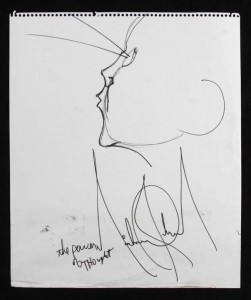 Do you see how this works? How might this apply to Michael Jackson’s life and to what happened to him? How might it apply to your life? To your thinking? To your view of the world? What about other people in your life and world? Does it impact how you experience them? What if their view of the world is informed with a cynical view or perspective? Is their opinion and experience informed by how and who they are being? Does it differ from yours? Ok, what now?
Do you see how this works? How might this apply to Michael Jackson’s life and to what happened to him? How might it apply to your life? To your thinking? To your view of the world? What about other people in your life and world? Does it impact how you experience them? What if their view of the world is informed with a cynical view or perspective? Is their opinion and experience informed by how and who they are being? Does it differ from yours? Ok, what now?
Have you ever looked through binoculars from the wrong end? The world certainly looks different, doesn’t it? Is that view accurate? What about the original view that magnifies the world? How does that analogy apply to the discussion here? Do beliefs about the world come from experience or do beliefs about the world determine experience?
The people who were quick to have an opinion about Michael Jackson (or anyone for that matter) were informed by their own view of the world, by the unique lenses through which they look. They often reported what they believed to be “truth” but the truth that was supported their own twisted viewpoint. And if the individual reporting had any motivation or need to feed the ego, feel superior to balance an inferiority complex or percieved injustice or inequality, or to focus behavior fuled by ambition along with an inherent need to find evidence to support their world view (as we all do) Michael suffered because they projected their own ego’s rejected shadow onto him. It’s the part of the human psyche that points fingers at others because it cannot bear to acknowledge its own dark side. It is the person who points and says “I certainly am not capable of that!” But the problem is, they are. The very reason they have “charge” with or on another person is because that projected shadow lives in self. You cannot see in someone else something that hasn’t correspondingly taken up residence within self.
If someone’s beliefs echo who they are being then while looking at the end result or the resulting behavior or the end product that person produces, do you think you might be able to extrapolate (backwards- by looking through the other end) what kind of person they are being? And if you want to know who you are being, take a look around you. Your life is evidence of who you are being. The world and how it is, is evidence of what your beliefs are, or what the predominent beliefs are that meet agreement in the population. It’s the collective reality. If the collective reality is not pretty, then a collective contingent is the only thing that can change it. Can one person inspire a revolution? Absolutely. Are you that person? Are you part of the new world because you are part of the contingency that is here to change it? Perhaps that is precisely who and what you are.
I hope you will spend some time thinking about this post and what it means and the broad impact of the discoveries linked to that reflection on reality and what informs it. Do you suppose this kind of reflection and self reflection is common practice? Do you suppose most people know how beliefs create outcomes? And that collective beliefs and action create new outcomes? Do you suppose most individuals examine their own world view and ask, is that accurate? Do most people look at their own beliefs and ask: “is this indoctrination,” or “is it projection,” or “is my viewpoint based on experience and am I selecting evidence to perpetuate that experience,” or “is today a brand new day completely pregnant with possibility?” Notice how when you label or define something, it becomes more real. Notice how you “step into a notion” and then become that notion by taking up residence there.
Michael Jackson said countless times that ‘children were the future,’ that ‘children were evidence for God in the world,’ that the innocence of a child was a gift to the world that should be cherished and nurtured.’ Yet people did not hear that message or they ridiculed him for it. What do you make of that? What does that say about the world? About humanity? Do you “get that” at some very deep level but have trouble putting it into words? Is there a kind of heartbreak that accompanies that deep knowing that “gets it” and because the world “didn’t get” it or “get Michael?” I understand. And someday you will too. It’s important that you hang on to your conviction about that; it’s important to keep the faith that the reveal is coming and that change is on the way.
When I feel that discouragement, I try to remember the words of Arundati Roy: “Not only is a new world possible, she is on her way. On a quiet day I can hear her breathing.”
What follows is an essay written by Michael Jackson himself about his own spirituality and experience of the spiritual and how it informs his world and his life especially in regard to children. Given our previous discussion, what can you learn about Michael Jackson? About his detractors? About himself? Let’s play, then let’s discuss.
Behold the insignts; behold the world. Behold salvation on its way back.
My Childhood, My Sabbath, My Freedom
by Michael Jackson
(An Essay Michael wrote for Belief Net (c) 2000)
What I wanted more than anything was to be ordinary. The Sabbath was when I could be.
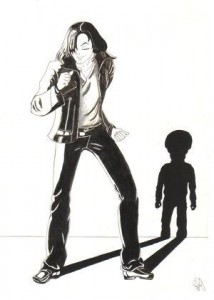 Childhood:
Childhood:
“Have you seen my childhood?
I’m searching for that wonder in my youth
Like pirates in adventurous dreams,
Of conquest and kings on the throne…”
Written and Composed by Michael Jackson
“In one of our conversations together, my friend Rabbi Shmuley told me that he had asked some of his colleagues–-writers, thinkers, and artists-–to pen their reflections on the Sabbath. He then suggested that I write down my own thoughts on the subject, a project I found intriguing and timely due to the recent death of Rose Fine, a Jewish woman who was my beloved childhood tutor and who traveled with me and my brothers when we were all in the Jackson Five.
Last Friday night I joined Rabbi Shmuley, his family, and their guests for the Sabbath dinner at their home. What I found especially moving was when Shmuley and his wife placed their hands on the heads of their young children, and blessed them to grow to be like Abraham and Sarah, which I understand is an ancient Jewish tradition. This led me to reminisce about my own childhood, and what the Sabbath meant to me growing up.
When people see the television appearances I made when I was a little boy–8 or 9 years old and just starting off my lifelong music career–they see a little boy with a big smile. They assume that this little boy is smiling because he is joyous, that he is singing his heart out because he is happy, and that he is dancing with an energy that never quits because he is carefree.
But while singing and dancing were, and undoubtedly remain, some of my greatest joys, at that time what I wanted more than anything else were the two things that make childhood the most wondrous years of life, namely, playtime and a feeling of freedom. The public at large has yet to really understand the pressures of childhood celebrity, which, while exciting, always exacts a very heavy price.
More than anything, I wished to be a normal little boy. I wanted to build tree houses and go to roller-skating parties. But very early on, this became impossible. I had to accept that my childhood would be different than most others. But that’s what always made me wonder what an ordinary childhood would be like.
There was one day a week, however, that I was able to escape the stages of Hollywood and the crowds of the concert hall. That day was the Sabbath. In all religions, the Sabbath is a day that allows and requires the faithful to step away from the everyday and focus on the exceptional. I learned something about the Jewish Sabbath in particular early on from Rose, and my friend Shmuley further clarified for me how, on the Jewish Sabbath, the everyday life tasks of cooking dinner, grocery shopping, and mowing the lawn are forbidden so that humanity may make the ordinary extraordinary and the natural miraculous. Even things like shopping or turning on lights are forbidden. On this day, the Sabbath, everyone in the world gets to stop being ordinary.
But what I wanted more than anything was to be ordinary. So, in my world, the Sabbath was the day I was able to step away from my unique life and glimpse the everyday.
Sundays were my day for “Pioneering,” the term used for the missionary work that Jehovah’s Witnesses do. We would spend the day in the suburbs of Southern California, going door to door or making the rounds of a shopping mall, distributing our Watchtower magazine. I continued my pioneering work for years and years after my career had been launched.
Up to 1991, the time of my Dangerous tour, I would don my disguise of fat suit, wig, beard, and glasses and head off to live in the land of everyday America, visiting shopping plazas and tract homes in the suburbs. I loved to set foot in all those houses and catch sight of the shag rugs and La-Z-Boy armchairs with kids playing Monopoly and grandmas baby-sitting and all those wonderfully ordinary and, to me, magical scenes of life. Many, I know, would argue that these things seem like no big deal. But to me they were positively fascinating.
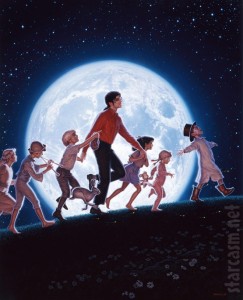 The funny thing is, no adults ever suspected who this strange bearded man was. But the children, with their extra intuition, knew right away. Like the Pied Piper of Hamlin, I would find myself trailed by eight or nine children by my second round of the shopping mall. They would follow and whisper and giggle, but they wouldn’t reveal my secret to their parents. They were my little aides. Hey, maybe you bought a magazine from me. Now you’re wondering, right?
The funny thing is, no adults ever suspected who this strange bearded man was. But the children, with their extra intuition, knew right away. Like the Pied Piper of Hamlin, I would find myself trailed by eight or nine children by my second round of the shopping mall. They would follow and whisper and giggle, but they wouldn’t reveal my secret to their parents. They were my little aides. Hey, maybe you bought a magazine from me. Now you’re wondering, right?
Sundays were sacred for two other reasons as I was growing up. They were both the day that I attended church and the day that I spent rehearsing my hardest. This may seem against the idea of “rest on the Sabbath,” but it was the most sacred way I could spend my time: developing the talents that God gave me. The best way I can imagine to show my thanks is to make the very most of the gift that God gave me.
Church was a treat in its own right. It was again a chance for me to be “normal.” The church elders treated me the same as they treated everyone else. And they never became annoyed on the days that the back of the church filled with reporters who had discovered my whereabouts. They tried to welcome them in. After all, even reporters are the children of God.
When I was young, my whole family attended church together in Indiana. As we grew older, this became difficult, and my remarkable and truly saintly mother would sometimes end up there on her own. When circumstances made it increasingly complex for me to attend, I was comforted by the belief that God exists in my heart, and in music and in beauty, not only in a building. But I still miss the sense of community that I felt there–I miss the friends and the people who treated me like I was simply one of them. Simply human. Sharing a day with God.
When I became a father, my whole sense of God and the Sabbath was redefined. When I look into the eyes of my son, Prince, and daughter, Paris, I see miracles and I see beauty. Every single day becomes the Sabbath. Having children allows me to enter this magical and holy world every moment of every day. I see God through my children. I speak to God through my children. I am humbled for the blessings He has given me.
There have been times in my life when I, like everyone, has had to wonder about God’s existence. When Prince smiles, when Paris giggles, I have no doubts. Children are God’s gift to us. No–they are more than that–they are the very form of God’s energy and creativity and love. He is to be found in their innocence, experienced in their playfulness.
My most precious days as a child were those Sundays when I was able to be free. That is what the Sabbath has always been for me. A day of freedom. Now I find this freedom and magic every day in my role as a father. The amazing thing is, we all have the ability to make every day the precious day that is the Sabbath. And we do this by rededicating ourselves to the wonders of childhood. We do this by giving over our entire heart and mind to the little people we call son and daughter. The time we spend with them is the Sabbath. The place we spend it is called paradise.

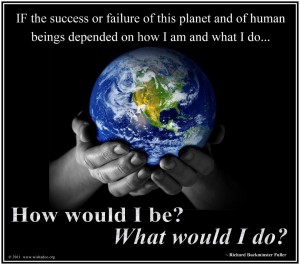
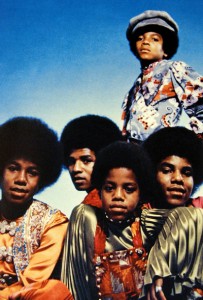
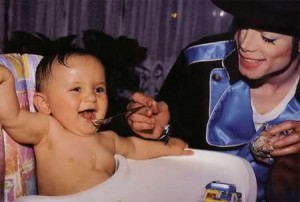
6 Comments
Beautiful! Love this post, your questions, the drawing by Michael (the power of thought: where did you find it?–it’s amazing), and Michael’s remarkable essay. Yes, ‘rededicating ourselves to the wonders of childhood’–what a great concept. I love MJ’s focus on the ‘playfulness’ of God–meaning creativity and love, freedom and magic. LOVE THIS!! THANK YOU!! This is something to reflect on, contemplate over and over. Yes, he was enlightened–I really believe this.
Wow, thank you for this. I am very conscious of my thoughts, words and actions as I am sincerely starting to understand that we create our worlds through what we put into our energy fields. I am working on my energy field as I want to help create a more loving and peaceful world. When we finally wake up and realize that we have that level of power, it’s amazing and scary all at the same time. It’s only scary because of how long we’ve been unaware. Even when I see people react or that are negative, my viewpoint is much different now that I understand this. I know that they have the same spark of love and light that I do, but perhaps they do not remember or see it yet. I want the world that I live in to be one of peace, hope and unity. So I am working to become part of the solution.
I just wonder if Michael inherently understood this or was it something that he remembered as he was growing up? I say remember because when we are born, it is said we already have all the knowledge there is; however, we do not remember and we forget more as we move into adulthood. Our childhood innocence gets lost along the way, I am sorry to say.
Michael’s essay was a good reminder of how much we don’t understand what he went through. He really appreciated the simple things in life. Love, compassion, empathy, grace, humility, etc., are simple attributes and because the public and the media projected their stuff onto Michael, those attributes were not acknowledged. That is truly a very sad story. I sincerely hope that more people read this post. I just saw a story on the news about a young girl who has created a new project. Her project is to stand out on Michigan Avenue in Chicago with a whiteboard that displays inspiring and positive messages for anyone to see. She has been doing this for the month of December. Not sure if she will continue after the new year. She has inspired so many people, including those who were suffering. In one case per one one of the comments on her blog, she has helped this person get through some very hard times with what she is doing. The fact that she is doing this alone helped this person because they are inspired. So without a doubt people can change the world; a few words a time. We all know how words can hurt and they can also heal. Michael is not here any longer to see the benefits of the many healing words that people are saying on his behalf, but the benefits of those healing words are changing the energy. That is clear to me. I am very grateful to see this happening. So I will continue to work on clearing my energy and filling it up with love, light and hope because that is what I want to see in the world. Thank you and Namaste!
Taking responsibility for the energy that I bring into this space. As for the ‘ponders’ in your post – like this one,for example: “Do beliefs about the world come from experience or do beliefs about the world determine experience?” I believe it’s a little of both. For myself it’s about balance. Thank you for posting the drawing Michael did! I fell in love with that right away when I saw it back when his drawings were released from ‘The Hangar.” Love..
Thank-you for reminding us of Michael’s Sabbath essay. I want to try to remain swimming in his words – “The amazing thing is, we all have the ability to make every day the precious day that is the Sabbath. And we do this by rededicating ourselves to the wonders of childhood. We do this by giving over our entire heart and mind to the little people we call son and daughter. The time we spend with them is the Sabbath. The place we spend it is called paradise.” Its probably going to take trememdous dedication, but I am positive this is where a real healing is. My angels will protect me while I am rededicating myself to wonder. I can just hear them all going “Oh my God, FINALLY”.
Thank you so much for reminding us all these so beautiful words Michael wrote or said. Yes he was a spiritual person, mystical, he was more aware of Love, Light than most of people on earth. Throuigh all his life he gave us messages and he’s still helping us to try to be better and better. Love Michael. Love Barbara
The spiritual insight and commentary that is Michael Jackson always leaves me satiated….He is truly an amazing guide and teacher and I for one have decided that he will be my guru.Thank you Barbara for all that you do to bring Michael’s essence to us. Victoria